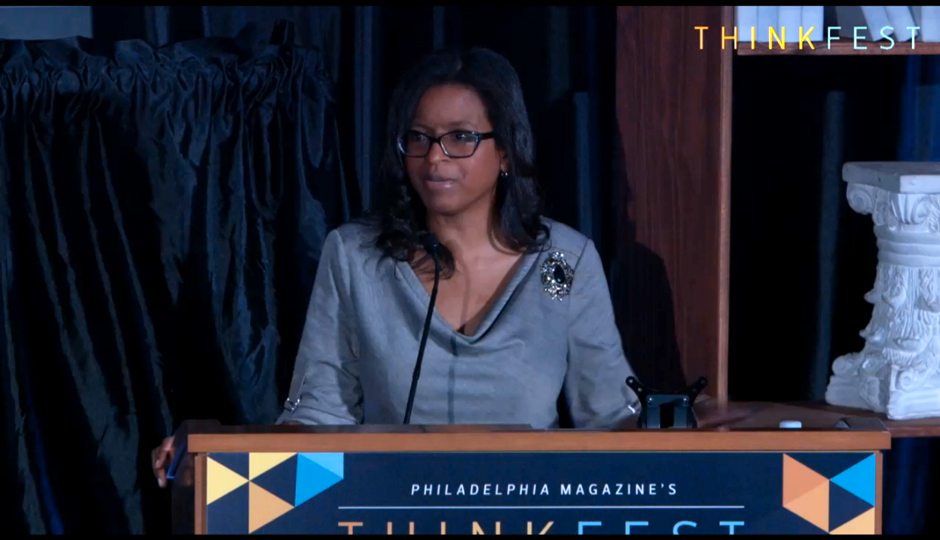ThinkFest Recap: Farah Jimenez on How Bleeding Hearts Hurt Those They Mean to Help

Farah Jimenez at ThinkFest.
ThinkFest is streaming live all day. Watch ThinkFest here.
Within the very liberal city of Philadelphia, there’s the still more-liberal world of the non-profit sector; within that sector, there’s the tiny subgroup of do-gooders who who dedicate their professional lives to fighting poverty and homelessness.
This is the world Farah Jimenez has worked in for much of her life. She’s not like the others.
“Not once have I ever been accused of having a bleeding heart,” Jimenez said Friday morning at ThinkFest, in a speech that amounted to a broad critique of how society generally — and the non-profit world in particular — approach poverty and homelessness.
Jimenez is a School Reform Commissioner, and the former president of People’s Emergency Center (a non-profit social service agency for homeless families). She’s also a prominent conservative who thinks bleeding hearts and compassion have gotten in the way of effective decision-making.
“Since the pronouncement of President Lyndon Johnson’s War on Poverty, we’ve spent an estimated $22 trillion on anti-poverty initiatives,” said Jimenez. “Did it make a difference? Every year, just in this five-county region, the social — or nonprofit — sector, comprised of 15,000 agencies, generates more than $35 billion in revenue and employs nearly 250,000 people. Those are big numbers, big investments, but is it making a difference?”
Jimenez didn’t answer her own question. Her goal at ThinkFest, she said, was more limited: “to challenge the orthodoxy that at times keeps us from examining our collective work and insisting on an answer to: Is it making a difference?”
Other highlights:
Jimenez on long-term solutions to poverty: Jimenez said that she’s often asked at social events what she would do — if she could do anything — to end inter-generational poverty. She has two answers. The first is quality schools, and when she says that, everyone nods along. Her second answer? “I would ensure that every child was born in wedlock.” And the typical reaction? “Horror. Just complete horror. I know some of you in the audience had a visceral reaction to what I just said. I know, forgive me, I don’t do political correctness well.” Jimenez cited the 1965 Moynihan Report, which linked black poverty to the rate of single mothers in the black community. The impact of that report has been both profound and controversial. Recently, Ta-Nehisi Coates argued in The Atlantic that, contrary to Moynihan’s intentions, the report fueled the boom in America’s incarceration rate, with devastating effects for many African-American families.
Jimenez on confronting facts: “If we want to really address this problem, we need to confront the facts before us and use them as a starting place to design a response to the generational poverty issues before us. We can do so with empathy and understanding, but if we ignore our heads because the facts break our hearts, then we need to ask ourselves — are we really committed to solving family homelessness and generational poverty, or do we just want to feel good trying?”
Jimenez on who’s leading: “In Philadelphia, pushing for this head-led, data-driven, prove-it approach to the work are two [drivers]. Believe it or not, the City of Philadelphia, and a Boston-based disruptor called the Greenlight Fund. In 2013, Mayor Michael Nutter established a city agency, called the Office of Community Empowerment and Opportunity. Led by Eva Gladstein, the agency published a Shared Prosperity Plan. It’s purpose was not to run any particular program, but rather to become a central repository of data, metrics, and measures that would enable us as a City, and its partners in the nonprofit community, to set collective goals for poverty alleviation and to hold themselves collectively accountable. [There’s] less, ‘I feel like I’m doing a good job’. More, ‘I know whether or not I’m having an impact.'”